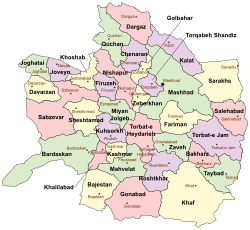Quchan County
Quchan County
Persian: شهرستان قوچان | |
|---|---|
 Landscape near Yadak village, Quchan County | |
 Location of Quchan County in Razavi Khorasan province (top left, green) | |
 Location of Razavi Khorasan province in Iran | |
| Coordinates: 37°09′N 58°35′E / 37.150°N 58.583°E[1] | |
| Country | Iran |
| Province | Razavi Khorasan |
| Capital | Quchan |
| Districts | Central, Abkuh, Bajgiran, Quchan Atiq |
| Area | |
• Total | 3,848 km2 (1,486 sq mi) |
| Population (2016)[2] | |
• Total | 174,495 |
| • Density | 45/km2 (120/sq mi) |
| Time zone | UTC+3:30 (IRST) |
| Quchan County at GEOnet Names Server | |
Quchan County (Persian: شهرستان قوچان) is in Razavi Khorasan province, Iran. Its capital is the city of Quchan.[3]
History
[edit]Until 2003, Quchan County had three districts: The Central, Bajgiran, and Faruj Districts, the latter of which was separated from the county in the establishment of Faruj County of North Khorasan province.[4]
After the 2016 National Census, the villages of Almajeq,[5] Mezerj,[6] and Shahr-e Kohneh[5] were elevated to city status.
In 2019, Dughayi Rural District was separated from the Central District in the formation of Abkuh District, including the new Bahar Rural District.[7] Quchan Atiq Rural District was also separated from the Central District to form Quchan Atiq District, including the new Yazdan Rural District.[8]
Demographics
[edit]Population
[edit]At the time of the 2006 census, the county's population was 179,613 in 45,502 households.[9] The following census in 2011 counted 179,714 people in 51,045 households.[10] The 2016 census measured the population of the county as 174,495 in 52,851 households.[2]
Administrative divisions
[edit]Quchan County's population history and administrative structure over three consecutive censuses are shown in the following table.
| Administrative Divisions | 2006[9] | 2011[10] | 2016[2] |
|---|---|---|---|
| Central District | 169,575 | 171,421 | 166,868 |
| Dughayi RD | 13,180 | 11,857 | 11,704 |
| Quchan Atiq RD | 24,559 | 23,226 | 21,037 |
| Shirin Darreh RD | 15,898 | 14,332 | 15,435 |
| Sudlaneh RD | 18,985 | 18,246 | 17,088 |
| Mezerj (city)[a] | |||
| Quchan (city) | 96,953 | 103,760 | 101,604 |
| Abkuh District[b] | |||
| Bahar RD[b] | |||
| Dughayi RD | |||
| Almajeq (city)[c] | |||
| Bajgiran District | 10,038 | 8,293 | 7,625 |
| Dowlatkhaneh RD | 9,285 | 7,887 | 7,031 |
| Bajgiran (city) | 753 | 406 | 594 |
| Quchan Atiq District[d] | |||
| Quchan Atiq RD | |||
| Yazdan RD[d] | |||
| Shahr-e Kohneh (city)[c] | |||
| Total | 179,613 | 179,714 | 174,495 |
| RD = Rural District | |||
See also
[edit]![]() Media related to Quchan County at Wikimedia Commons
Media related to Quchan County at Wikimedia Commons
Notes
[edit]References
[edit]- ^ OpenStreetMap contributors (3 November 2024). "Quchan County" (Map). OpenStreetMap (in Persian). Retrieved 3 November 2024.
- ^ a b c Census of the Islamic Republic of Iran, 1395 (2016): Razavi Khorasan Province. amar.org.ir (Report) (in Persian). The Statistical Center of Iran. Archived from the original (Excel) on 2 April 2022. Retrieved 19 December 2022.
- ^ Habibi, Hassan (c. 2015) [Approved 21 June 1369]. Approval of the organization and chain of citizenship of the elements and units of the divisions of Khorasan province, centered in Mashhad. rc.majlis.ir (Report) (in Persian). Ministry of the Interior, Defense Political Commission of the Government Council. Proposal 3223.1.5.53; Approval Letter 3808-907; Notification 84902/T125K. Archived from the original on 17 November 2015. Retrieved 6 January 2024 – via Islamic Parliament Research Center.
- ^ Aref, Mohammad Reza (26 November 2014) [Approved 20 March 1383]. Divisional changes and reforms in Khorasan province. rc.majlis.ir (Report) (in Persian). Ministry of the Interior, Council of Ministers. Notification 13808/30786H. Archived from the original on 17 November 2015. Retrieved 3 November 2024 – via Research Center of the Islamic Council of Iran.
- ^ a b c "The Ministry of the Interior agreed in principle to the promotion of two villages of Quchan to cities". irna.ir (in Persian). Ministry of the Interior, Cabinet of Ministers. c. 2021. Archived from the original on 15 June 2021. Retrieved 6 May 2023 – via Islamic Republic News Agency.
- ^ a b Jahangiri, Ishaq (5 August 2021) [Approved 5 March 1400]. Letter of approval regarding national divisions in Quchan County, Razavi Khorasan province. qavanin.ir (Report) (in Persian). Ministry of the Interior, Council of Ministers. Proposal 186259. Archived from the original on 5 May 2023. Retrieved 5 May 2023 – via Laws and Regulations Portal of the Islamic Republic of Iran.
- ^ a b Jahangiri, Ishaq (29 December 2019) [Approved 29 September 1399]. Approval letter regarding national divisions in Quchan County, Razavi Khorasan province. rrk.ir (Report) (in Persian). Ministry of the Interior, Council of Ministers. Proposal 77484; Notification 109152/H56788T. Archived from the original on 2 January 2021. Retrieved 5 May 2023.
- ^ a b Jahangiri, Ishaq (26 September 2019) [Approved 29 September 1399]. Letter of approval regarding national divisions in Quchan County, Razavi Khorasan province. rrk.ir (Report) (in Persian). Ministry of the Interior, Council of Ministers. Proposal 68742; Notification 109157/H56757T. Archived from the original on 2 January 2021. Retrieved 5 May 2023.
- ^ a b Census of the Islamic Republic of Iran, 1385 (2006): Razavi Khorasan Province. amar.org.ir (Report) (in Persian). The Statistical Center of Iran. Archived from the original (Excel) on 20 September 2011. Retrieved 25 September 2022.
- ^ a b Census of the Islamic Republic of Iran, 1390 (2011): Razavi Khorasan Province. irandataportal.syr.edu (Report) (in Persian). The Statistical Center of Iran. Archived from the original (Excel) on 20 January 2023. Retrieved 19 December 2022 – via Iran Data Portal, Syracuse University.

